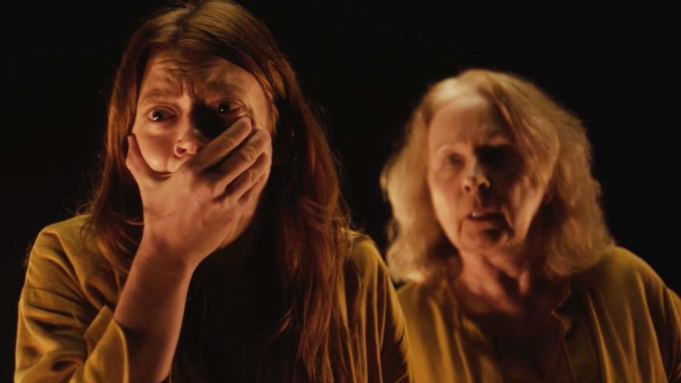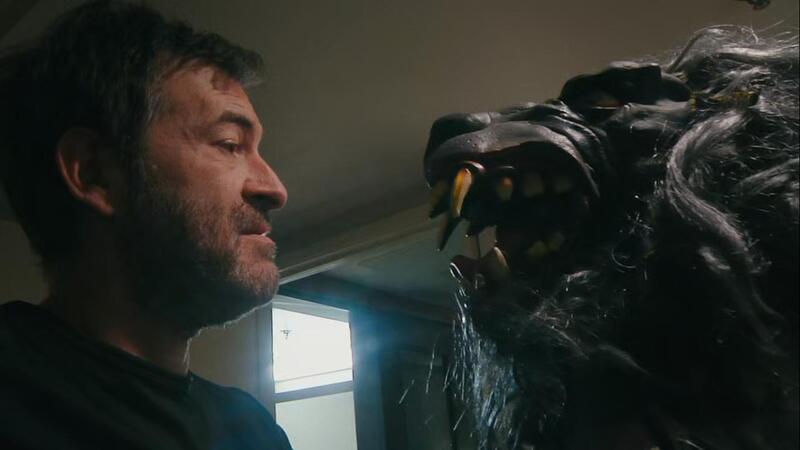
Desperation Finds a Home in Grief
MOVIE REVIEW
The Surrender
–
Genre: Drama, Horror, Thriller
Year Released: 2025
Runtime: 1h 39m
Director(s): Julia Max
Writer(s): Julia Max
Cast: Colby Minifie, Kate Burton, Neil Sandilands, Vaughn Armstrong, Mia Ellis, Pete Ploszek, Chelsea Alden, Alaina Pollack, Riley Rose Critchlow, Lola Prince Kelly
Where to Watch: streaming on Shudder Friday, May 23, 2025
RAVING REVIEW: The push and pull between moving on and holding on is at the heart of this story of loss, loyalty, and the rituals we create to avoid facing reality. Anchored by potent performances and a setting that becomes as intense as the characters themselves, this one takes an unflinching look at the emotional chaos that follows death, and how the most human instincts can lead us down inhuman paths.
Rather than hiding its emotion, the film throws us into the middle of a tense, intimate portrait of two women sharing a space but rarely the same perspective. A daughter returns to help her mother care for a dying father, only to find their already fragile dynamic on the brink. Their clashes—exchanged glances, whispered accusations, carefully concealed habits—say as much as any dramatic outburst could.
What’s most striking isn’t the introduction of a supernatural element, but how seamlessly it integrates with the story’s grounded emotional foundation. The mystical isn’t a left turn; it’s a direct continuation of the spiral. When the idea of a ritual is introduced, it doesn't arrive with ominous thunder or cultish bravado—it slinks in through the cracks left by sorrow. The decision to treat the occult as an outgrowth of personal vulnerability rather than something wholly external is what makes the shift into horror feel so organic.
The sense of dread doesn’t come from creatures or jump scares—it comes from watching someone cling to a belief system out of fear of being alone. And even more harrowing is watching someone else pretend to believe in it to keep their loved one from falling apart. That emotional tightrope becomes the story’s main tension, and the stakes are heightened not by danger, but by the possibility of emotional collapse.
Performance plays a major role in making that tension feel real. One character carries herself with quiet tension, always trying to keep control, while the other shows an unraveling disguised as resolve. Their performances don't compete—they complement each other in a way that makes every confrontation feel earned and every silence like it carries weight. It’s rare to see horror used this effectively as a container for emotional truth.
As the story builds to its climax, the tone shifts into more conventional horror territory, which may not land with the same resonance for everyone. The focus starts to blur slightly under the weight of surreal imagery and physical spectacle. While the final act doesn’t lose its effectiveness completely, it feels like a step away from the grounded approach that held together the early portions.
If the ending feels murky, it’s likely because it wants to be. Rather than offering a tidy conclusion or a definitive stance, the film argues that some things—especially loss—can’t be solved, explained, or reversed. The ambiguity may be frustrating, but it’s also thematically consistent. The story begins in a place of uncertainty and refuses to betray that tone for the comfort of resolution.
Another smart choice is the refusal to cast clear moral judgments. Both leads can be flawed, sympathetic, and, at times, deeply frustrating. The story isn’t interested in heroes and villains—it’s interested in the human mess of grief, in how people justify the unjustifiable when the pain becomes too much.
By the time the credits roll, what’s stayed with you isn’t the horror in the traditional sense—it’s the realization that the scariest thing in the world might be watching someone you love retreat into a belief you can’t follow. The tension doesn’t come from what’s behind a locked door, but from knowing that someone you care about might open it anyway, believing it’s the only way to keep going.
Horror is used not as a gimmick, but as a tool for exposing how easily the human mind can unravel when it’s forced to accept something it simply doesn’t want to believe. That blend of emotional complexity and genre confidence makes this worthwhile, even if it is more obscure than satisfying. The fact that it doesn’t offer easy answers is, in some ways, its most honest moment.
Please visit https://linktr.ee/overlyhonestr for more reviews.
You can follow me on Letterboxd, Instagram, Twitter, and YouTube. My social media accounts can also be found on most platforms by searching for 'Overly Honest Reviews'.
I’m always happy to hear from my readers; please don't hesitate to say hello or send me any questions about movies.
[photo courtesy of SHUDDER, CODEPENDENT FILMS]
DISCLAIMER:
At Overly Honest Movie Reviews, we value honesty and transparency. Occasionally, we receive complimentary items for review, including DVDs, Blu-rays, CDs, Vinyl Records, Books, and more. We assure you that these arrangements do not influence our reviews, as we are committed to providing unbiased and sincere evaluations. We aim to help you make informed entertainment choices regardless of our relationship with distributors or producers.
Amazon Affiliate Links:
Additionally, this site contains Amazon affiliate links. If you purchase through these links, we may receive a commission. This affiliate arrangement does not affect our commitment to honest reviews and helps support our site. We appreciate your trust and support in navigating these links.



Average Rating